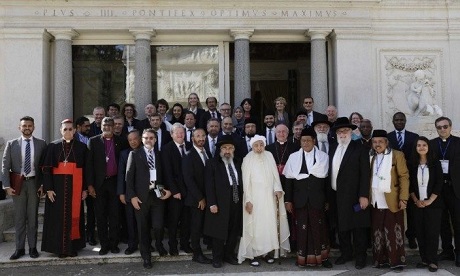Numerous representatives of Christian, Jewish and Muslim faiths met at the Vatican this week to signs a joint Declaration denouncing euthanasia and physician-assisted suicide.
After signing the Declaration, they presented it to Pope Francis.
All three Abrahamic monotheistic religions share common goals and are in complete agreement in their approach to end-of-life situations.
The twelve-point Declaration aims to present the three religions’ position about the terminally ill.
The Declaration begins by making it clear that the signatories “categorically” refuse euthanasia and assisted suicide.
These actions are “inherently consequentially morally and religiously wrong and should be forbidden with no exceptions. Any pressure upon dying patients to end their lives by active and deliberate actions is categorically rejected, the signatories say.
Another point concerns health care providers.
They should not be coerced or pressured to “either directly or indirectly assist in the deliberate and intentional death of a patient … especially when it is against the religious beliefs of the provider … conscientious objection that should be universally respected,”.
In addition, validated and professional palliative care everywhere and for everyone should be encouraged and supported:
“…We are morally and religiously duty-bound to provide comfort, effective pain, and symptoms relief, companionship, care and spiritual assistance to the dying … and their family.”
The Declaration commends the laws and policies protecting the rights and the dignity of the dying … to avoid euthanasia and promote palliative care.
In addition, society must make sure a patient’s desire not to be a burden doesn’t make them feel useless and subsequently lose awareness of their life’s value and dignity.
All health care providers should have to create conditions so religious assistance is assured to anyone who explicitly or implicitly asks for it.
The Declaration commits the signatories to using their knowledge and research to shape policies promoting socio-emotional, physical and spiritual care and wellbeing.
They are also committed to engaging their communities on the issues of bioethics about the dying and “acquaint them with techniques of compassionate companionship for the suffering and dying”.
In addition, they promise will raise public awareness about palliative care through education and providing resources concerning treatments for the suffering and the dying.
They have also committed to providing succor to the dying person’s family and loved ones.
The Declaration calls on all policy-makers and health-care providers to familiarize themselves with this wide-ranging Abrahamic monotheistic perspective and teaching. In this way they will be able to provide the best care to dying patients and their families who adhere to the religious norms and guidance of their respective religious.
Lastly, the Declaration guarantees the signatories are “committed to involving the other religions and all people of goodwill”.
Source
- Zenit
- Times of Israel
- Image: Vatican News
